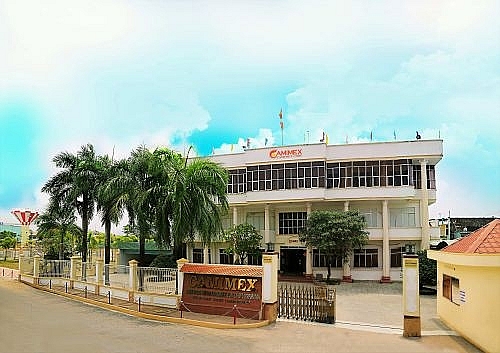Stock trading inconsistencies spotted at Camimex Group
 |
| Something stinks in the household of Camimex Group? |
The recent transactions involving Camimex Group, a large local shrimp exporter and producer, raised the red flag over a painful lack of transparency during the process of calling for capital.
Notably, the Ho Chi Minh City Stock Exchange (HSX) issued the information that Nguyen Trong Ha, chief accountant of Camimex Group, registered selling 3.05 million shares.
The transaction is implemented under the put through method, which is expected to occur from May 18 to June 16, 2020. Ha is currently the largest shareholder of the company, but after the sale, her interest in the company would be zero.
Previously, on May 13, Dang Ngoc Son, a member of the board of directors cum deputy general director of Camimex registered to sell nearly 3 million shares (equalling 11.29 per cent) under the put through method to decrease his holding in the company to 0 per cent. The transaction is expected to occur from May 19 to June 18.
At the same time, Vu Thi Bich Ngoc, the wife of chairman Bui Si Tuan of the Board of Directors, registered to buy 2.99 million Camimex shares, equalling 11.29 per cent stake. The purchase is expected to be completed between May 12 and June 12, 2020.
Without context, these moves would be normal. However, in light of the extraordinary activities in previous months, they become suspect.
Notably, in late January 2020, Camimex published the business results for 2019. Accordingly, full-year profit increased by 74 per cent on-year. Besides, its share value increased by 60 per cent on-year. After that, in early February, Camimex sold 114 million shares to existing shareholders (equaling 100 per cent of its charter capital). At the time, 134 domestic shareholders bought 9.4 million shares (71.2 per cent of the offered shares), five foreign shareholders bought 799 shares, and four private investors bought 3.81 million shares.
Notably, chief accountant Nguyen Trong Ha and Dang Ngoc Son – a member of the Board of Directors cum deputy general director – bought 11.54 and 11.29 per cent of the charter capital. In addition, Ha Van Bang, an investor who previously did not own any Camimex shares, also bought 1.6 million shares to become a large shareholder with the ownership ratio of 6 per cent.
After this sale, in late March 2020, the company published the audited financial statement for 2019, which showed that its after-tax profit decreased by 70.7 per cent against the unaudited figure, while the profit for the whole year declined by 49.1 per cent. As a result, its shares plunged to VND10,800 (46.96 US cents) on April 22.
However, since late April, its shares have risen to VND18,000 (78.26 US cents). Especially, at transaction sessions when its shares hit the ceiling rate, large volumes of shares were matched.
An issue noted by the HSX was that Son and Ha increased their shareholding in the firm from nothing to more than 11 per cent each in only two months and then want to divest their entire holdings via put through deals. On May 11 and 13, Ha Van Bang also transferred his entire holding in the company.
In light of the above information, investors expressed concerns that these shareholders, who are in fact related to the company, only bought share that would have been left unsold otherwise to make the sale seem more successful than it actually was and then wait for the shares to rise and sell.
In addition, in the audited financial statement for 2018, there was a qualified opinion from the State Audit Office of Vietnam relating to the unsold shares, however, the State Securities Commission of Vietnam still authorised the company to implement its initial public offering (IPO) in 2019.
Furthermore, on March 28, 2020, on the day the company published information about the sale, the Board of Directors of the company issued the decision to adjust the purpose of using the mobilised capital. Accordingly, instead of using part of the capital to invest in machinery and equipment and another part to supplement the working capital, the company will pour the entire proceeds into the working capital. Some investors expressed concerns over the sudden change as well as the steps to reach shareholders' approval for the change.
VIR contacted the investors with these concerns and is waiting for their reply.
What the stars mean:
★ Poor ★ ★ Promising ★★★ Good ★★★★ Very good ★★★★★ Exceptional
Related Contents
Latest News
More News
- Foreign leaders extend congratulations to Party General Secretary To Lam (January 25, 2026 | 10:01)
- 14th National Party Congress wraps up with success (January 25, 2026 | 09:49)
- Congratulations from VFF Central Committee's int’l partners to 14th National Party Congress (January 25, 2026 | 09:46)
- 14th Party Central Committee unanimously elects To Lam as General Secretary (January 23, 2026 | 16:22)
- Worldwide congratulations underscore confidence in Vietnam’s 14th Party Congress (January 23, 2026 | 09:02)
- Political parties, organisations, int’l friends send congratulations to 14th National Party Congress (January 22, 2026 | 09:33)
- Press release on second working day of 14th National Party Congress (January 22, 2026 | 09:19)
- 14th National Party Congress: Japanese media highlight Vietnam’s growth targets (January 21, 2026 | 09:46)
- 14th National Party Congress: Driving force for Vietnam to continue renewal, innovation, breakthroughs (January 21, 2026 | 09:42)
- Vietnam remains spiritual support for progressive forces: Colombian party leader (January 21, 2026 | 08:00)

 Tag:
Tag:


























 Mobile Version
Mobile Version